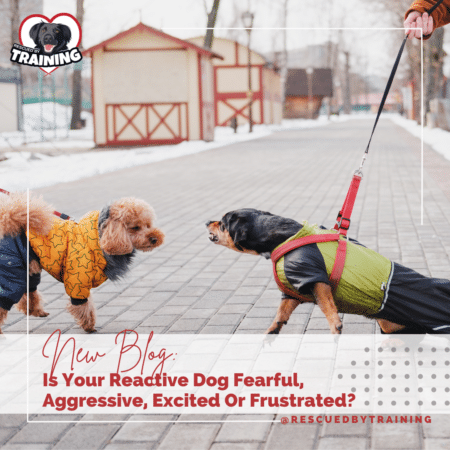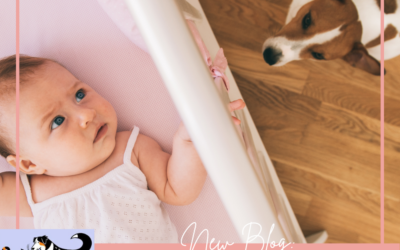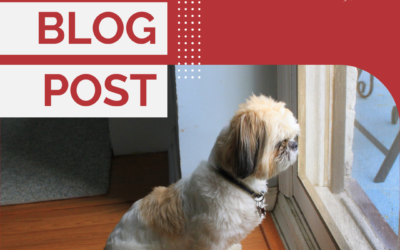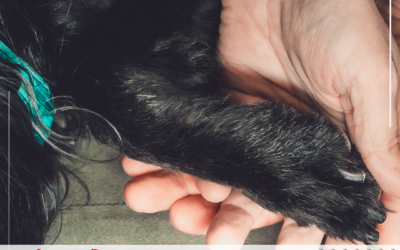There’s a lot of euphemisms in dog training, mostly trying to smooth over things that don’t sit well with us. Aversive trainers and electric fence companies will tell you the shock collar is “just a vibration like your cell phone or TENS unit.” People who have dogs who are afraid of strangers often spin it as “he’s protecting me.” Recently there’s been a big increase in “reactivity” being a catch all term for all dogs who bark, lunge or otherwise alert to stuff, without any distinction between dogs who are fearful or aggressive and those who might be friendly but excited or frustrated. And as an owner, it’s hard to know the difference. Even many “professionals” don’t know how to know the difference.
If you have a dog who is reactive on leash – one that lunges, growls or barks at other dogs, it would be a normal assumption to make that your dog is “aggressive.” And many owners do this out of a sense of responsibility – not wanting to let their dog potentially hurt another dog. And this is completely understandable and very responsible. But, not all reactive dogs are aggressive. And this is an important distinction to make.
Why are dogs reactive on leash? They could be:
- Fearful
- Aggressive
- Frustrated
- Excited
But the danger of lumping all dogs, regardless of what their underlying issue is, into a broad reactivity category is that we may not be addressing the dog’s real issue and could be depriving them of appropriate social opportunities, which becomes a quality of life concern.
What if they’re not aggressive? What if they’re frustrated or excited? What if the barking, lunging, growling and posturing isn’t to try to keep that other dog away but is that your dog is actually social and friendly and doesn’t have a good way to express the frustration because he’s on a leash (or behind a barrier, like a fence or window) that prevents him from having the social interaction he so desperately wants?
What if your dog is reactive but just untrained and barks or jumps out of excitement for attention? If we keep frustrated or excited dogs away from the thing that the want access to, it will only exacerbate the frustration or increase the excitement next time your dog is exposed to that thing. The proper way to handle this type of case would be to teach the dog an alternate, incompatible behavior. If we don’t like the dog jumping and pulling to get to people to greet, then train a solid sit or stand/stay for attention.
You may have seen this video or similar, where dogs look very aggressive – snarling, snapping – at other dogs through a gate and when the gate is removed, the dogs go on their way. Or this one of a Corgi and Golden through a glass door. And then the follow-up here. This is a great example of barrier frustration and it can happen with fences, windows, leashes or other barriers or restraints.
Of course some dogs may be afraid of other dogs and they are lunging, barking or growling in attempt to communicate “please keep your distance” but we cannot tell just by looking at them. If your dog is actually fearful in that situation then the behavior modification plan would include helping your dog feel more comfortable, controlling his environment and eventually changing the underlying emotion from “oh, this is scary” to neutral or “oh, boy, I love when dogs or people come around. They’re not scary at all and good stuff happens when they come around!”
These are two very different approaches for handling a “reactive” dog but without understanding what is driving the behavior we’re seeing, we can’t fully modify the behavior.
And this is where many other unqualified trainers fall short. They don’t know how to tell the difference and handle all reactive dogs the same way,
If we don’t make a distinction between fearful and frustrated reactive dogs, we could be sentencing a dog who is frustrated and social, to a life of solitary confinement, being deprived of interactions with their own species and that’s inhumane.
That’s like saying you as a human can’t have any interactions with your friends because you’ve bickered or yelled at a friend in the past. This is why working with a qualified behavior professional is so very important.
If you need help with your reactive dog or any other issue, you can schedule your session here!
Happy training!
![]()




